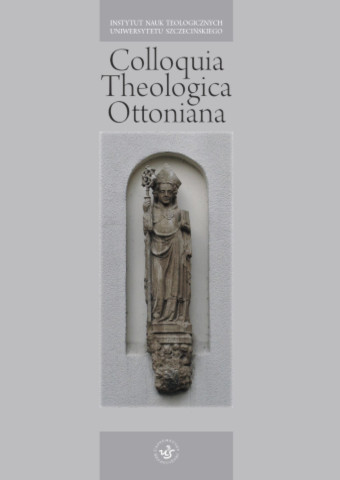
ISSN: 1731-0555
eISSN: 2353-2998
OAI
DOI: 10.18276/cto.2019.1-11





Issue archive /
1/2019
Poziom duchowości i religijności u katolików zaangażowanych i niezaangażowanych w służbę liturgiczną
(The Level of Spirituality and Religiousness in the Catholics Being Involved and not Involved in the Liturgical Service)
| Authors: |
Ewelina
Wojtarkowska
Wydział Teologiczny Uniwersytetu Szczecińskiego |
| Keywords: | spirituality religiousness liturgical service formation |
| Data publikacji całości: | 2019-09-01 |
| Page range: | 21 (201-221) |
Abstract
This article describes research on the relationships between Spirituality and Religiosity with the involvement in liturgical formation and with such factors as: sex, age and education of the respondents. The theoretical basis for studying the level of Spirituality is the concept of treating it as human’s ability subject to development. It consists of ethical sensitivity, harmony and religiosity, as well as the general level of spirituality. Religiosity is understood as a system of meanings, that consists of: orientation, sense and generally understood religiosity. The Self-Written Questionnaire authored by I. Heszen-Niejodek, E. Gruszczyńska and A. Metlak and the Religious Questionnaire of the Significance System by D. Krok were used to obtain the results. The research results indicate that people undertaking liturgical formation are characterized by a higher level of Spirituality and Religiosity than non-committed people. The higher level of both variables is also presented by women in comparison with men. These studies are of a pilot nature and can form the basis for pastoral activities and further research in the scope of these human dispositions.
Download file
Article file
Bibliography
| 1. | Blachnicki F. Liturgia a wspólnota, Kraków 2015. |
| 2. | Elkins D.N., Beyond religion: toward a humanistic spirituality, w: The handbook of humanistic psychology: Leading edges in theory, research, and practice, red. K.J. Schneider, J.T. Bugental, J.F. Pierson, Thousand Oaks 2001, s. 201–212. |
| 3. | Golan Z., Pojęcie religijności, w: Podstawowe zagadnienia psychologii religii, red. S. Głaz, Kraków 2006, s. 71–79. |
| 4. | Heszen-Niejodek I., Gruszczyńska E., Wmiar duchowy człowieka, jego znaczenie w psychologii zdrowia i jego pomiar, „Przegląd Psychologiczny” 47 (2014), s. 15–31. |
| 5. | Hill P.C., Mearsuerment in the psychology of religion and spirituality: Current status and evaluation, w: Handbook of the psychology of religion and spirituality, red. R.F. Paloutzian, C.L. Park, New York 2005, s. 43–61. |
| 6. | Jung G., Symbol przemiany w mszy, Warszawa 1998. |
| 7. | Kędziora S., Duchowość i religijnosć osób starszych, w: Społeczne wymiary, red. A. Fabiś, M. Muszyński, Bielsko-Biała 2011, s. 147–156. |
| 8. | King U., The Dance of Life. Spirituality, Ageing and Human Flourishing, w: Ageing, Spirituality and Well-being, red. A.Jewell, London 2004, s. 130–132. |
| 9. | Konferencja Episkopatu Polski, Dyrektorium Duszpasterstwa Służby Liturgicznej, Częstochowa 2008. |
| 10. | Krok D., Religijność a jakość życia w perspektywie mediatorów psychospołecznych, Opole 2009. |
| 11. | Mateusiak J., W poszukiwaniu przejawów duchowości, „Przegląd Psychologiczny” 47 (2004), s. 33–46. |
| 12. | Park C.L., Religion and meaning, w: Handbook of the psychology, red. R.F. Paloutzian, C.L. Park, New York 2005, s. 45–48. |
| 13. | Pettet J.R., Approaching spirituals problems in psychotherapy: A conceptual framework, „Journal of Psychotherapy Practice and Research” 3 (1994), s. 237–245. |
| 14. | Popielski K., Psychologiczno-egzystencjalna interpretacja problematyki sensu i sensowności, w: Człowiek – wartości – sens, red. K. Popielski, Lublin 1996, s. 50–53. |
| 15. | Prężynka W., Funkcja motywacyjna wartości religijnych w osobowości człowieka, w: Wykłady z psychologii w KUL w roku akademickim 1985/86, red. A. Biela, Lublin 1988, s. 260–265. |
| 16. | Sobór Watykański II, Konstytucja o liturgii świetej „Sacrosanktum concilium”, Wrocław 1997. |
| 17. | Walesa C., Wyjaśnianie religijności człowieka (analiza psychologiczna), w: Studia z psychologii KUL, red. P. Francuz, P. Oleś, W. Otrębki, t. 11, Lublin 2003, s. 21–38. |